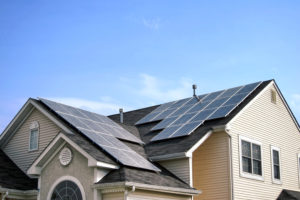 Because my opinion on solar keeps changing with the more information gathered, I have rewritten this article three times.
Because my opinion on solar keeps changing with the more information gathered, I have rewritten this article three times.
I initially decided to write on solar after my own experience with selling a home and how solar impacted the sales price. I started out feeling pretty negative about the benefit of solar based on my experience, but the more I looked into it, saw the tax credit and savings, I started to think maybe it was a good idea and headed in that direction.
Then, I learned more about the fees, not for the initial purchase of the system, but the fees the utility companies charge and how they vary. There is a huge difference between the benefit of solar if you are serviced by SRP or APS. You may not be given all this information from the solar companies, so you need to do some homework on the additional fees and surcharges your utility company charges.
TAX CREDIT
Although they have become more affordable in recent years, solar panel systems still are a considerable expense for the average homeowner. Arizona currently offers a tax credit equivalent to 25 percent of the system cost, capped at $1,000. The federal tax credit is 30 percent of the cost.
SRP versus APS
Both utility companies will charge a monthly service fee for grid access and maintenance. If you use more power than your solar produces, which usually is in the summer months, you will be billed a usage fee, which will vary between APS and SRP. The biggest difference, however, is the demand fee and how much higher SRP’s fee is.
You may not have a demand fee with APS, depending on the plan you use. APS also will bank excess power your system produces for you to pull from during the months when you use more. SRP will not bank your excess, but pays you the wholesale rate at the end of each month. You could get paid the lowest rate for the excess and then billed the highest rate for the usage. There are more options becoming available, such as batteries to store your excess, so you can be completely off the grid. However, these are very expensive.
LEASING
At this time, you cannot get a leased solar system if your utility company is SRP. Since SRP implemented the demand fee and additional surcharges (unless you were grandfathered in), there is very little economic gain, and leasing companies will not service to homeowners within SRP.
SELLING YOUR HOME WITH SOLAR
Owned Solar System—There is no question owned solar far out ways leased solar when it comes to resale. When the solar is owned, the value both the buyer and the lender should place on the solar is based on the savings and what other homes with solar panels have sold for in the same neighborhood. This can be a challenge, as there may not be any recent comps with solar panels.
When I listed a home with solar panels, I called the vice president of one of the appraisal companies in the area. He calculates the value by taking the savings over the past year, multiplies by 3 and that is the value. For the home I had listed, the savings in the past year was $1,700 multiplied by 3, which is $5,100.
The appraiser should have added $5,100 to the value of the home for the solar. You can imagine how shocked we were when the appraisal came back and he didn’t add anything at all for the solar. I am sure this was the exception and not the rule, and appraisers will add some value for solar. Even then, however, it’s not going to be very much compared to the original cost. So, don’t plan on getting a return on your investment when you sell, especially if you are in SRP where your savings will be less.
Leased Solar System—Appraisers and lenders will not give any value on a leased solar system. A home with leased solar also can be a turn off for some buyers, as they would have to take over the lease. The buyer would need to qualify with the leasing company, and the monthly payment would be included in the buyer’s monthly debt to income ratio, which could reduce the loan amount for which the buyer would then qualify.
PAYBACK
The average homeowner moves every five to seven years. Therefore, if you are not committed to staying in your home for at least eight to 10 years, purchasing a solar system might not make sense from an investment standpoint. You may want to wait until you are in a home you plan to stay in longer.
Lorraine Ryall has been a Multi-Million Dollar producer for the past seven years. You can reach Lorraine at (602) 571-6799. You also can send her an email at Lorraine@Homes2SellAZ.com, or visit her website at Homes2SellAZ.com.

